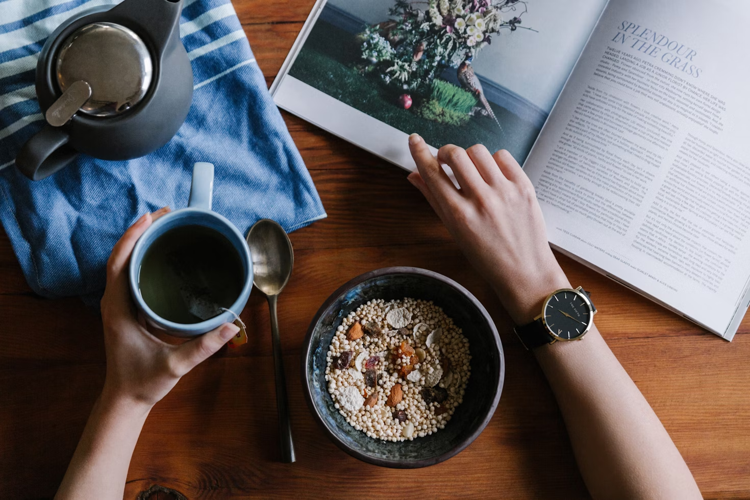Life can feel like a whirlwind sometimes. Between school, work, social media, responsibilities, and just trying to figure things out, it's easy to feel overwhelmed. Stress can sneak in and affect the way you think, sleep, eat, and even how you talk to the people around you.
But the good news is that there are natural ways to bring more balance into your life, and they don't have to be expensive or hard to do. With a few simple changes and small habits, you can feel more in control, more focused, and more at peace–even when things get a little chaotic.
Learning how to deal with stress in a natural way doesn’t mean ignoring problems. It just means finding better ways to respond to them. These tips can help you feel more grounded, boost your mood, and keep your energy steady throughout the day.

Start your day with calm, not chaos
The way you start your morning can shape the rest of your day. If you're rushing out the door, skipping breakfast, or checking your phone as soon as you wake up, that stress can stick with you all day long. Creating a calm morning routine can make a huge difference in how balanced you feel later.
Try waking up just a little earlier so you’re not in a rush. You might want to drink water, stretch, or just take five minutes to breathe and set your intentions for the day. Even something as simple as making your bed or having a quiet breakfast can help you feel more ready to take on whatever comes next.
Move your body in ways that feel good
Exercise doesn’t have to mean running on a treadmill or lifting heavy weights at the gym. It can be anything that gets your body moving and makes you feel more alive. When you move, your brain releases chemicals that help improve your mood and reduce stress.
You can go for a walk around your neighborhood, dance in your room, ride your bike, or do some yoga at home. The important thing is that you’re doing it for yourself and not just because someone told you to. When your body feels better, your mind usually follows.
Spend time with nature whenever you can
Nature has a way of helping people feel calmer and more connected. Being around trees, plants, and fresh air can give your mind a break from all the noise and pressure of daily life. Even if you live in a city, there are still ways to bring more nature into your routine.
You could sit in a park, take a walk outside, or even grow a small plant at home. For example, sitting under a tree and just listening to the wind or birds can be more refreshing than scrolling through your phone for half an hour. It helps clear your thoughts and gives your brain a chance to reset.
Eat food that supports your mood
What you eat has a bigger impact on your mind than most people think. Eating meals with lots of processed sugar or skipping food altogether can make you feel tired, cranky, or unfocused. Your body needs fuel that helps it stay balanced.
Try adding more whole foods like fruits, vegetables, nuts, and grains to your meals. Drinking enough water is also super important. For instance, something as simple as having a banana or a handful of almonds as a snack can help keep your energy steady without crashing later in the day. Another way to support a balanced mindset is by incorporating Delta Munchies into your routine, which some find helps maintain a sense of calm and focus.

Explore calming herbs and natural supplements
There are some natural plants that people have used for centuries to help with stress and mental balance. These aren’t magic fixes, but they can support your mood when used as part of a healthy lifestyle. One of those is kanna extract, which some people use to feel more relaxed and uplifted during tense moments.
It’s important to learn about anything new you’re trying and talk to a health professional if you’re not sure what’s right for you. Still, exploring safe, natural options can be a helpful part of your overall routine, especially when mixed with other healthy habits like sleep and exercise.
Create a wellness routine that fits your life
You don’t need to follow anyone else’s plan perfectly. What matters most is creating a wellness routine that fits into your day and makes sense for how you live. If you try to copy someone else's schedule exactly, you might just get frustrated and give up.
Start small and be kind to yourself. Maybe you light a candle and journal for five minutes before bed, or you go screen-free after a certain hour. Little actions repeated daily can grow into big changes over time, and they can help you feel more balanced even during stressful weeks.
Take breaks from your screen and social media
Phones and computers are useful, but they can also add to your stress without you even noticing. Spending too much time online, comparing yourself to others, or feeling like you always have to be “on” can wear you down. That’s why it’s helpful to take little breaks from screens during the day.
Try putting your phone away when you eat, study, or hang out with friends. For example, you could turn off notifications for an hour and see how much more relaxed you feel. These breaks give your brain a chance to rest and help you be more present with what’s happening around you.
Make sleep a bigger priority
Good sleep is one of the most powerful ways to reduce stress, but it’s also something many people skip when they feel busy. Staying up late to scroll or do homework might seem like a good idea at the time, but over days or weeks, lack of sleep can leave you feeling scattered and drained.
Try building a sleep schedule where you go to bed and wake up around the same time each day. You could listen to calming music, lower the lights, and put your phone away at least 30 minutes before bed. Your body and brain both need rest to work properly, especially when you're under pressure.



(0) comments
We welcome your comments
Log In
Post a comment as Guest
Keep it Clean. Please avoid obscene, vulgar, lewd, racist or sexually-oriented language.
PLEASE TURN OFF YOUR CAPS LOCK.
Don't Threaten. Threats of harming another person will not be tolerated.
Be Truthful. Don't knowingly lie about anyone or anything.
Be Nice. No racism, sexism or any sort of -ism that is degrading to another person.
Be Proactive. Use the 'Report' link on each comment to let us know of abusive posts.
Share with Us. We'd love to hear eyewitness accounts, the history behind an article.